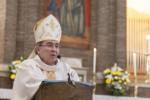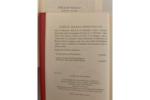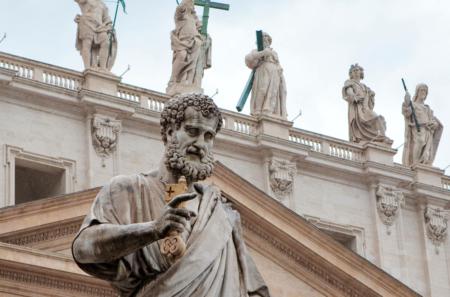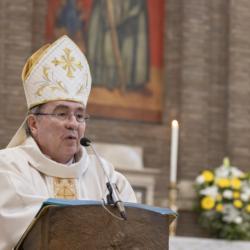Examining one's conscience with the Curia
Just before Christmas, Pope Francis met with the Roman Curia, the staff of Vatican officials who assist him in guiding the Church, to exchange Christmas greetings. This year, though, in addition to thanking them for their work, and extending "prayerful good wishes for a holy Christmas and a Happy New Year," the pope used the occasion to beg God's "forgiveness for our failings" and offered the Curia an extended examination of conscience on how it can serve the Church better.
The examination of conscience detailed 15 "curial diseases" which can weaken the service which Church officials offer to the Lord. While it has been widely reported as a scathing, critique of the Curia, what strikes me about the list is how applicable it is to all of us who work in institutional settings, whether firms or schools or government offices, inside or outside the Catholic Church.
I happen to know a few people who work or have worked in the Roman Curia, and my impression is that most people who work there are upright and selfless public servants. Doubtless there are also grasping, venal, selfish individuals there as well. But that could also be true of, say, the Department of Motor Vehicles or a university, or the legislature or businesses.
And so, let's consider these diseases prevalent in many institutional settings, including our own. While it's relatively easy to blame some bureaucrat in Rome for whatever ails us, the spirit of the pope's examination is, I think, to ask ourselves about any dysfunction we're personally responsible for.
1. "The disease of thinking we're 'immortal,' 'immune,' or downright 'indispensable.'" Do I think that the world revolves around me, or have I experienced a Copernican revolution of the spirit, which makes me realize that other people and other ideas can often be more important?
2. "Excessive busy-ness." Do we value the contemplative virtues of thought, reflection and rest, as well as the active virtues of work and business?
3. "Mental and spiritual 'petrification'" characteristic of the hard-hearted and stiff-necked. Or are we sufficiently supple and flexible, and sensitive to meet the needs of the people we serve?
4. "Excessive planning and functionalism." Are we open to the unpredictable actions of the Holy Spirit?
5. "Poor coordination." Do we operate as a loose cannon rather than as part of a functioning organic whole?
6. "Spiritual Alzheimer's disease," which consists in losing the memory and in "those who are completely caught up in the present moment, in their passions, whims and obsessions." Or do we retain our memory and act in light of the past, in the present for the future?
7. "Rivalry and vainglory." Do we worry more about the good we can do and less about who can claim credit?
8. "Existential schizophrenia," a "double life" that restricts itself "to bureaucratic matters, thus losing contact with reality, with concrete people." Do we avoid the temptation of teaching others to only listen to what we say, paying no attention to the man behind the curtain and how we ourselves behave?
9. "Gossiping, grumbling and back-biting." Do we raise issues directly with those concerned, or do we complain behind their backs?
10. "Idolizing superiors." Do we suck-up to those in power, being careerists and opportunists, or do we cooperate with those in authority to advance the common good?
11. "Indifference to others." Are we sensitive to the needs of others?
12. "A lugubrious face." Do we bring a cheerful, upbeat disposition to our job and the challenges we face in life?
13. "Hoarding." Do we think that accumulating stuff is a priority, as if we could take it all with us when we move on or die?
14. "Closed circles" or "cliques." Are we open to all human beings simply because they are human beings, rather than because they are part of a smaller group that we're more comfortable with?
15. "Worldly profit or forms of self-exhibition." Are money, power, and fame the objects of our striving, rather than love of God and others?
Judge yourself for yourself.
DWIGHT G. DUNCAN IS PROFESSOR AT UMASS SCHOOL OF LAW DARTMOUTH. HE HOLDS DEGREES IN BOTH CIVIL AND CANON LAW.
- Dwight G. Duncan is professor at UMass School of Law Dartmouth. He holds degrees in both civil and canon law.



















